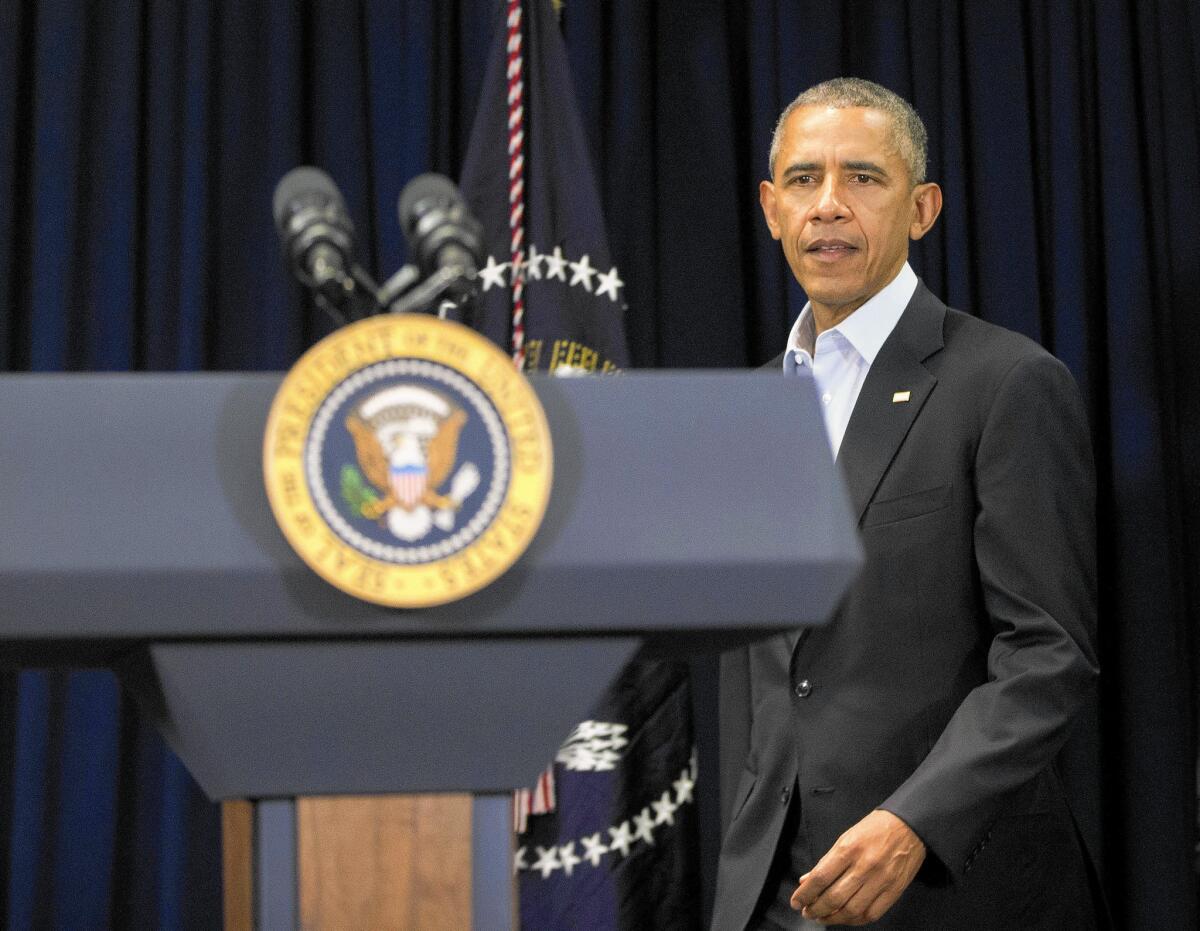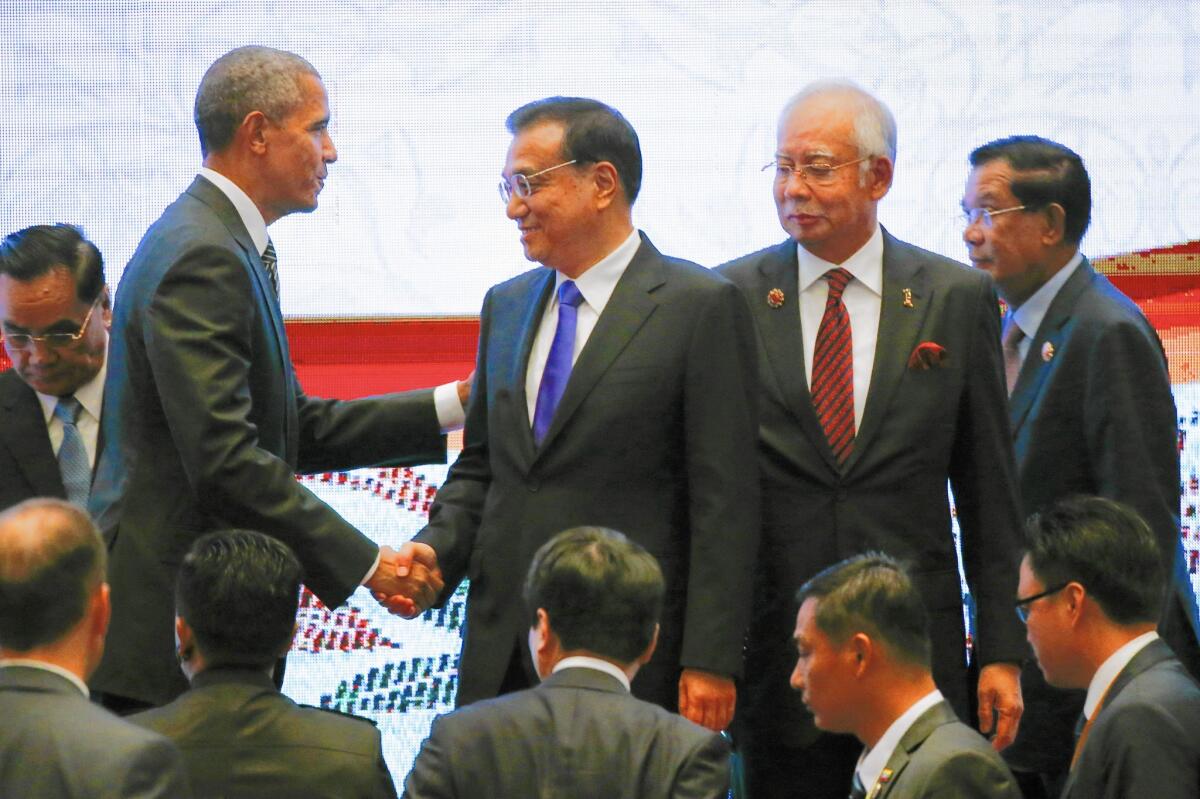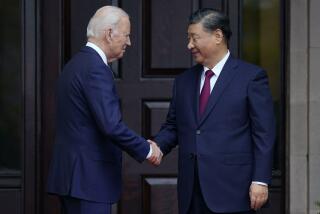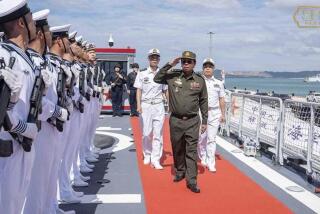Obama hosts ASEAN summit, a first in the U.S.

President Obama hosts leaders from the Assn. of Southeast Asian Nations at the Sunnylands estate in Rancho Mirage.
President Obama on Monday will kick off a two-day summit with 10 Southeast Asian leaders at Sunnylands in Rancho Mirage, the first-ever such meeting on U.S. soil.
The White House is framing the confab with the leaders of the Assn. of Southeast Asian Nations, or ASEAN, as another key step in Obama’s effort to “rebalance” foreign policy toward the Asia-Pacific, shoring up U.S. economic and security ties in the region — and asserting American leadership — as China exerts its military and financial might there too.
Among the issues on the agenda: maritime security and South China Sea disputes; Islamic State radicals and extremism; North Korea’s nuclear program and recent missile test; and the Trans-Pacific Partnership trade pact, entrepreneurship and innovation.
Administration officials and independent analysts say the summit is unlikely to produce detailed agreements, but the symbolism of the gathering is strong.

The White House says Obama will use one-on-one sessions with various leaders to raise concerns about human rights and democracy. But the gathering is drawing heat from critics who say it’s unseemly for the president to invite authoritarians such as Cambodia’s Hun Sen to “the Camp David of the West.” Protesters from Vietnamese American and Laotian American organizations, as well as anti-TPP groups, are among those expected to demonstrate near the estate.
Here’s a primer on the gathering.
What is ASEAN?
Ten countries — Indonesia, Malaysia, the Philippines, Singapore, Thailand, Brunei, Vietnam, Laos, Myanmar and Cambodia — make up the Assn. of Southeast Asian Nations. The grouping, established in 1967 with five members, was founded to “promote political and economic cooperation and regional stability.”
ASEAN member states have a total population of 600 million — more than the European Union, which covers about 500 million people.
ASEAN, though, is much less cohesive than the EU and doesn’t have a common currency like the euro or a common legislative body like the European Parliament. ASEAN countries run the gamut of governments. There are democracies, such as the Philippines; communist states, such as Laos; and an absolute monarchy, Brunei. They vary greatly in wealth: Singapore has a gross domestic product per capita of $56,286, while Cambodia’s is just $1,084, according to 2014 World Bank figures. And culturally, they include countries that are heavily Christian (the Philippines), mostly Buddhist (Myanmar) and majority Islamic (Indonesia, Brunei).
How is it pronounced?
AH-see-ahn.
How important are ASEAN countries to the United States?
The U.S. and the 10 ASEAN nations traded $254 billion in goods and services in 2014 — about 8% of all American trade, or the equivalent of about half the U.S. trade volume with China.
Four ASEAN countries — Vietnam, Singapore, Brunei and Malaysia — have joined the U.S.-led Trans-Pacific Partnership trade pact, and others have expressed interest.
“It’s America’s fourth-largest trading partner. It’s by far the largest destination for U.S. investment in Asia — more than China, Japan, South Korea and India combined. It’s huge,” said researcher Ian Storey of the Institute of Southeast Asian Studies in Singapore. “Southeast Asia is enormously important to the United States, and the Obama administration has been giving it the attention it deserves.”
About 4 million people living in the U.S. were born in ASEAN countries, including 1.8 million from the Philippines and 1.2 million from Vietnam, according to 2012 Census Bureau data. That’s about 10% of the foreign-born population. Among U.S. citizens naturalized in 2013, more than 111,000 came from ASEAN countries — 54% more than from mainland China.
How have U.S. relations with ASEAN been changing?
Some ASEAN members, such as the Philippines, are long-standing U.S. allies. Others, such as Myanmar and Laos, have had strained ties with Washington in recent decades. But relations have been on a general upswing since Obama took office in 2009.
In November, during an ASEAN summit in Malaysia, Obama announced that U.S.-ASEAN ties would be upgraded to the level of a “strategic partnership.”
The Sunnylands summit isn’t something Obama is doing out of obligation, said Satu Limaye, director of the East-West Center in Washington.
“It’s not like it’s our turn to host a summit. He just met with all these leaders in November and launched the U.S.-ASEAN strategic partnership,” he said. “I think Obama really wants to say, ‘Hey, we’re engaged in this region. We’ve got full diplomatic relations with everyone, for the first time in roughly 20 years; we’ve got ambassadors in every place, and this is part of my rebalance legacy.’ … This is the big capstone event.”
What will Obama and the Asian leaders discuss?
The summit will begin Monday afternoon with a session on the economy, innovation and entrepreneurship, said deputy national security advisor Ben Rhodes. That will be followed by a “working dinner” and a Tuesday morning session on security issues.
Obama will have “pull-away” sessions, or one-on-one meetings, with leaders, administration officials said.
Among the specific issues Obama will raise in group meetings, said Rhodes, are China’s land reclamation projects on islets in the South China Sea and Beijing’s recent test flights on a new runway at Fiery Cross Reef.
Counter-terrorism and law enforcement cooperation as well as North Korea’s nuclear program are on the agenda; Washington and Beijing lately have failed to see eye to eye on how to respond to Pyongyang’s purported test of a hydrogen bomb in January and a recent missile launch in violation of United Nations Security Council resolutions.
“The Sunnylands summit will be a diplomatic recruiting session as the Obama administration tries to line up Southeast Asian support for key pillars of the U.S. rebalance — particularly the Trans-Pacific Partnership and a ‘rules-based order’ in the South China Sea,” said John Ciorciari, an assistant professor at the University of Michigan who studies Southeast Asia.
So is this all really about China?
No, and yes, experts say.
“I don’t think there’s any doubt that there’s an element of competition between the U.S. and China in the region — politically, strategically and economically. That’s been apparent for some time now,” Storey said. China, he said, will be watching the summit closely, but “I don’t think there’s any sense of jealousy or angst or resentment about it. It’s not like this summit represents a loss for China. I don’t think they would see it that way.”
The choice of venue, though, clearly is freighted with some meaning toward Beijing. Sunnylands was the site of Obama’s 2013 “shirtsleeves” summit with Chinese President Xi Jinping.
“Of course, in Beijing people are inevitably going to draw comparisons with Xi’s visit,” Limaye said. Although it’s important not to overanalyze that, he said, “it is striking that the president has had two major meetings [at Sunnylands]: One with the leader of China and one with 10 countries in Southeast Asia that are having significant issues with China on the whole, both economic and security.”
Dan Kritenbrink, the National Security Council’s senior director for Asian affairs, acknowledged that “some of these issues that will be discussed will have some relation with China,” but he emphasized that the aim of the summit was to deepen engagement with ASEAN.
What about issues like democracy and freedom of speech?
Human rights organizations and civil society organizations have raised serious concerns about Obama’s decision to host a number of the ASEAN leaders on U.S. soil.
Among those drawing concern are Hun Sen of Cambodia, who has ruled for decades; Prime Minister Nguyen Tan Dung of Vietnam and President Choummali Saignason of Laos, both communist leaders of one-party states; and Hassanal Bolkiah, the sultan of Brunei, who has moved to impose sharia, or Islamic law.
“President Obama shouldn’t be rewarding abusive leaders with the prestige of a summit in the U.S.,” said John Sifton, Asia advocacy director at Human Rights Watch. “Inviting to the U.S. people who dismantle democracies or systematically repress their own people sends the wrong message to the world about the U.S. government’s respect for basic rights and freedoms.”
With so many Americans having fled repressive governments in Southeast Asia, Limaye said, the summit is likely to attract a substantial number of protesters from this country’s Vietnamese, Laotian and Hmong ethnic communities. “Clearly this hits home. Lots of Americans will say, ‘What’s up with this, what are we doing here?’”
More to Read
Start your day right
Sign up for Essential California for news, features and recommendations from the L.A. Times and beyond in your inbox six days a week.
You may occasionally receive promotional content from the Los Angeles Times.







